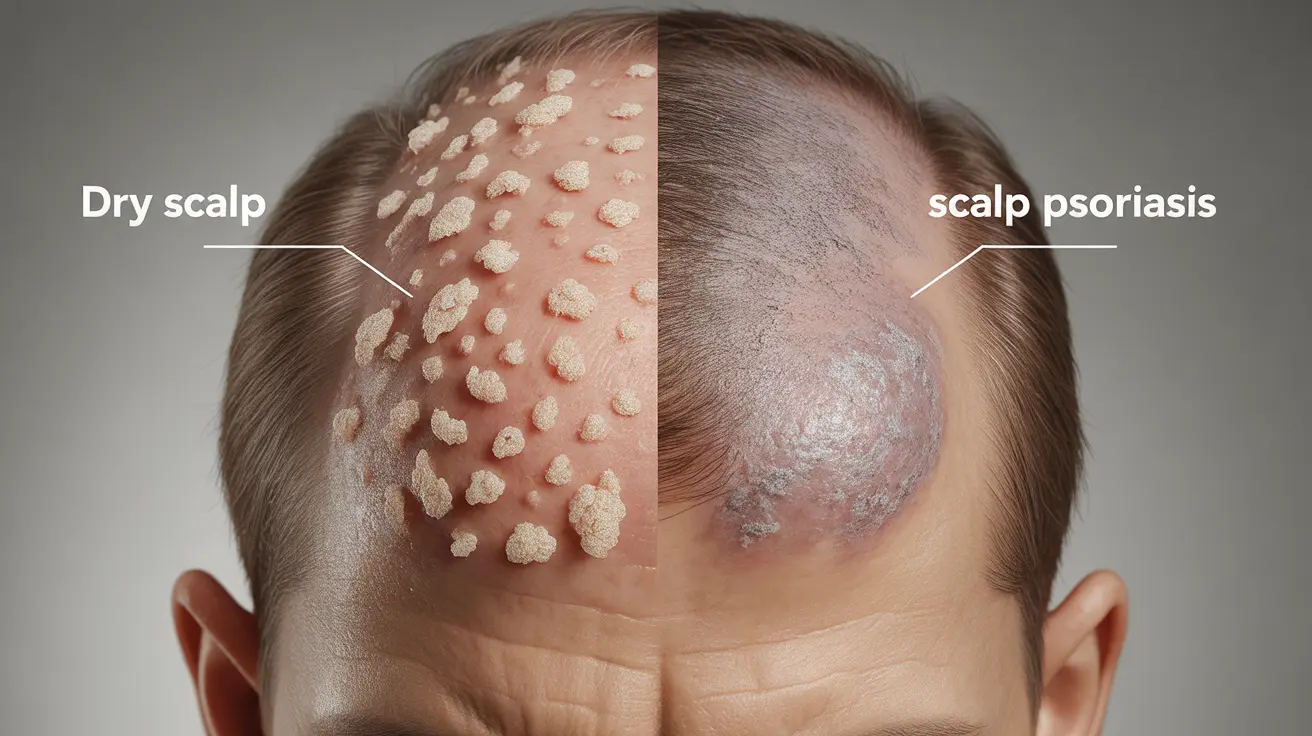Dealing with a dry, flaky scalp can be both uncomfortable and frustrating, especially when it's related to a chronic condition like scalp psoriasis. While many people experience occasional scalp dryness, understanding the difference between simple dry scalp and scalp psoriasis is crucial for proper treatment and management.
In this comprehensive guide, we'll explore the key differences between these conditions, their causes, and effective treatment approaches to help you better understand and manage scalp health.
Understanding the Difference Between Dry Scalp and Scalp Psoriasis
While both conditions can cause flaking and discomfort, they have distinct characteristics that set them apart. Dry scalp typically results in small, white flakes and may cause itching. Scalp psoriasis, however, tends to produce thicker, silvery-white scales and can be accompanied by redness, inflammation, and more intense itching.
Common Symptoms and Characteristics
Dry Scalp Symptoms
- Fine, white flakes
- General scalp itchiness
- Tight, uncomfortable feeling
- May improve with moisturizing
- Usually affects the entire scalp evenly
Scalp Psoriasis Symptoms
- Thick, silvery-white or reddish scales
- Well-defined patches
- More intense itching
- Possible bleeding when scales are removed
- Can extend beyond the hairline
- May be accompanied by psoriasis elsewhere on the body
Causes and Triggers
Understanding what causes these conditions is essential for effective treatment. Dry scalp often results from environmental factors, while scalp psoriasis has more complex underlying causes.
Common Causes of Dry Scalp
- Cold, dry weather
- Hot showers
- Harsh hair products
- Dehydration
- Poor nutrition
- Frequent hair washing
Scalp Psoriasis Triggers
- Stress
- Infections or illness
- Certain medications
- Skin injuries
- Cold weather
- Alcohol consumption
- Hormonal changes
Treatment Approaches
The treatment approach varies depending on whether you're dealing with dry scalp or scalp psoriasis. It's important to get an accurate diagnosis before starting any treatment regimen.
Managing Dry Scalp
- Use gentle, moisturizing shampoos
- Avoid hot water when washing hair
- Stay hydrated
- Consider using a humidifier
- Apply scalp-specific moisturizers
Treating Scalp Psoriasis
- Medicated shampoos containing salicylic acid or coal tar
- Topical corticosteroids
- Vitamin D analogues
- Light therapy
- Systemic medications for severe cases
Prevention and Home Care
Maintaining good scalp health requires consistent care and attention to potential triggers. Regular moisturizing, gentle hair care practices, and avoiding known irritants can help prevent flare-ups and maintain scalp health.
Frequently Asked Questions
What are the common symptoms that help distinguish scalp psoriasis from regular dandruff or dry scalp? Scalp psoriasis typically presents with thick, silvery-white scales in well-defined patches, while dry scalp produces smaller, whiter flakes throughout the scalp. Psoriasis scales are usually thicker and more persistent than regular dandruff.
What causes dry scalp and flaky patches in scalp psoriasis, and what triggers worsen the condition? Dry scalp is often caused by environmental factors and personal care habits, while scalp psoriasis is an autoimmune condition triggered by stress, infections, medications, and environmental factors. Both can be exacerbated by cold weather and harsh hair products.
How is scalp psoriasis with dry scalp diagnosed and differentiated from other scalp conditions like seborrheic dermatitis? A dermatologist typically diagnoses scalp psoriasis through physical examination of the affected areas, looking for characteristic thick, silvery scales and well-defined patches. They may also consider family history and the presence of psoriasis elsewhere on the body.
What treatment options are available to manage dry scalp and scaling caused by scalp psoriasis? Treatment options range from medicated shampoos and topical treatments to systemic medications for severe cases. Dry scalp often responds well to moisturizing treatments, while scalp psoriasis may require prescription medications or light therapy.
How can I care for my scalp at home to reduce dryness and prevent flare-ups of scalp psoriasis? Regular moisturizing, gentle hair care practices, avoiding hot water, using a humidifier, and identifying and avoiding personal triggers can help manage both conditions. Consistent use of prescribed treatments and maintaining good overall health are also important.




